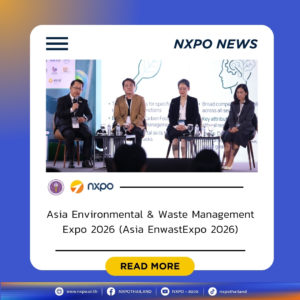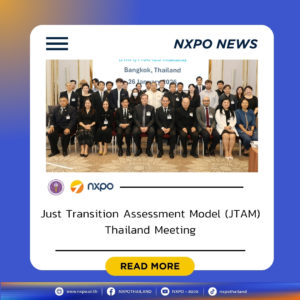NXPO, in collaboration with the Energy Research Institute of Chulalongkorn University, organized the workshop on “Strategic Framework for the Ministry of Higher Education, Science, Research and Innovation (MHESI) to Drive Climate Action” on 22 October 2025. The event was held as part of an on-going study examining the roles and impacts of the Draft Climate Change Act on MHESI’s mission.

In his opening remarks, Dr. Surachai Sathitkunarat, President of NXPO, stated that the workshop served as an important platform for exchanging ideas and defining strategic directions to advance Thailand’s climate action. This event followed the first workshop on “The Role of MHESI in Driving Climate Action” held on 27 August 2025, which analyzed the overall landscape and linkages between MHESI’s roles in advancing science, technology, and innovation (STI) covering five key areas: 1) strategy and policy formulation; 2) research and development support; 3) human resource and skill development; 4) innovation infrastructure and technology deployment; and 5) domestic and international collaboration.
To identify priorities and formulate policy recommendations, the Importance–Readiness Matrix tool was employed to assess both strategic importance and operational readiness. Based on the analysis, the strategic issues were grouped into four categories: 1) Quick Wins (High Importance / High Readiness); 2) Strategic Investments (High Importance / Low Readiness); 3) Low-hanging Fruit (Low Importance / High Readiness); and 4) Monitor and Explore (Low Importance / Low Readiness).
“Today’s workshop aims to gather insights and recommendations for prioritization, which will inform the draft strategic framework of MHESI. This framework will serve as a foundation for preparing Thailand’s higher education, science, research, and innovation system to support the implementation of the forthcoming Climate Change Act,” said Dr. Surachai.








During the session, Dr. Jakapong Pongthanaisawan from the Energy Research Institute presented the key findings from the prioritization exercise concerning MHESI’s roles in driving climate action under the draft Climate Change Act. Participants then joined group discussions to develop policy recommendations, resulting in the following outcomes:




1. Strategy and Policy in Higher Education, Science, Research, and Innovation (A1)
Participants proposed that MHESI serve as the central mechanism for formulating national strategies and policies in science, research, and innovation to support Thailand’s greenhouse gas (GHG) reduction goals. This includes developing a Climate Research and Innovation (R&I) Strategic Plan and a Technology Roadmap for Mitigation and Adaptation aligned with the Nationally Determined Contribution (NDC), National Energy Plan, National Adaptation Plan (NAP), and Circular Economy Plan. An integrated policy framework should be established to align agency programs, minimize duplication in innovation investments, and define a clear national pathway for climate action.
2. Research and Development Support (A2)
It was recommended that MHESI emphasize targeted research and multi-disciplinary approach to generate practical knowledge and technologies for various sectors, particularly in GHG mitigation and localized adaptation. Priority areas include the development of essential tools and technologies such as the Measurement, Reporting and Verification (MRV) systems and climate economic modeling for policy analysis. An Integrated Funding Framework should be introduced to align funding directions across Program Management Units (PMUs). Furthermore, the transfer of technology from laboratories to industry and communities should be strengthened to ensure that research outcomes deliver tangible economic and social benefits.
3. Human Resource and Skills Development (A3)
The meeting emphasized that human resource development is fundamental to implementing climate strategies. MHESI should therefore develop a Climate Human Resource Development Roadmap to guide skill enhancement among students, practitioners, researchers, and policymakers. The roadmap should focus on developing competencies required under the draft Climate Change Act—such as MRV specialists, carbon analysts, climate engineers, and policy planners. In addition, Climate Knowledge Hubs should be established both centrally and regionally to serve as centers for knowledge, databases, and training. University curricula should be updated, and collaboration with vocational education institutions strengthened to align with the low-carbon economy. A Climate Communicators Network should also be created to enhance science communication and raise public awareness.
4. Innovation Infrastructure and Technology Deployment (A4)
The meeting highlighted the need to accelerate the development of data and technology infrastructure to support effective climate management. This includes the creation of a National Climate Change Knowledge Platform integrating data on GHG emissions, climate conditions, carbon economics, and related economic indicators through big data and cloud systems. The platform would enhance data utilization for research, innovation, monitoring, and policymaking. In addition, the establishment of centers for piloting climate adaptation technologies in high-risk areas and the engagement of private sector and startups in green innovation should be encouraged to ensure sustainable local implementation.
5. National and International Collaboration (A5)
Participants proposed that MHESI play a leading role in fostering policy cooperation among domestic and international agencies. A Climate Change Policy Partnership on Science, Technology and Innovation Group should be established among key agencies such as the Office of the National Economic and Social Development Council (NESDC), Office of Natural Resources and Environmental Policy and Planning (ONEP), Thailand Greenhouse Gas Management Organization (TGO), Hydro–Informatics Institute (HII), Geo-Informatics and Space Technology Development Agency (GISTDA), and the private sector to harmonize data standards and policy directions. International cooperation should also be strengthened in knowledge exchange, technology transfer, and financial frameworks through green finance mechanisms and technology transfer programs. The meeting further underscored the importance of Public–Private–People Partnerships (PPP) to ensure inclusive and effective national climate action.
In the closing session, Assoc. Prof. Wongkot Wongsapai, Vice President of NXPO, stated that the insights and recommendations collected from experts and stakeholders will inform the drafting of MHESI’s policy framework. This framework will ensure greater integration and tangible support for implementing Thailand’s Climate Change Act.

The workshop outcomes reaffirmed MHESI’s role as the national mechanism for knowledge, science, research, and innovation, integrating five key components—strategy, research and development, human resources, infrastructure, and collaboration. This integrated approach will strengthen Thailand’s capacity to implement climate policies and advance the nation toward net-zero emissions and sustainable development.







